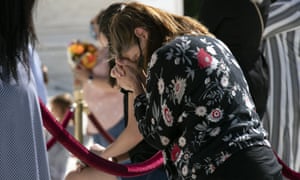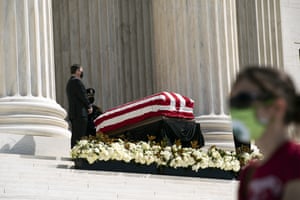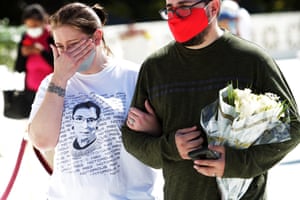Ruth Bader Ginsburg was devoted to opera. On Wednesday, from the top of the steps of the supreme court in Washington, the beloved late justice gave her final aria.
Ginsburg’s casket, draped in the stars and stripes, reflected bright autumnal sunshine as a river of mourners flowed beneath the court, which resembles a classical Greek temple, each pausing to look up and pay respects.
It was the kind of people’s tribute the liberal lion – who died last week aged 87 – would have cherished: men and women, gay and straight, Black and white, with numerous parents holding their children’s hands or trundling them along in push chairs.
The clear blue sky and serene mood was at odds with the dark political fight raging at the US Capitol a few hundred feet away.

Karen Liebowitz and her wife, Patricia Dwyer, both coronavirus survivors, had driven four and half hours from Tomkins Cove, New York, to be here. Dwyer wore a T-shirt that said, “Brooklyn. It’s where my story begins,” and said she, like Ginsburg, had attended James Madison high school in the borough. “She grew up in my area of Brooklyn. I know that Jewish instilling of values and doing right and justice. My wife and I wouldn’t be married if it was not for her,” she said.
It was a reference to the narrow supreme court decision in 2015 that legalized same sex marriage nationwide. Many here expressed fears that Donald Trump’s nominee to replace Ginsburg, due to be announced on Saturday, would reverse many of the rights the justice championed with gifted eloquence.
When the news of Ginsburg’s death broke on Friday, Liebowitz, 55, a geriatric social worker and psychotherapist, was “devastated”, she recalled. “It was visceral. It’s so involved in politics, even if you don’t want it to be, because everything is at stake. I feel like I lost a relative that fought for me.
“She represented what America should be: equal pay, gender, sexual roles, everything. That was her soul. But I feel now everything is at stake and could be reversed. It’s going to be horrifying. It feels like a fascist society.”

Dwyer, 58, a retail store manager, added: “I wanted to feel some solidarity with others who mourn the fact she’s gone. This small woman from Brooklyn did so much for the world. She deserves a send-off like this.”
Ginsburg’s love of opera was shared by the late conservative justice Antonin Scalia, with whom she was fast friends despite profound ideological differences. His death in the election year 2016, and hers in the election year 2020, have become bookends in the kind of rancorous partisanship they themselves transcended.
Her casket arrived at 9.30am the court she served for 27 years and was carried into the august great hall, past more than a hundred of her former law clerks who, wearing face masks and dressed in black, lined the steps like an operatic chorus.
The casket was placed on a catafalque first used for Abraham Lincoln after his assassination. The court’s remaining eight justices, all wearing face masks, were together for the first time since the building was closed in March and they switched to holding hearings via phone.

John Roberts, the chief justice, described his old colleague as a “tough, brave, a fighter, a winner” but also “thoughtful, careful, compassionate, honest”. He added: “Her voice in court and in our conference room was soft, but when she spoke people listened.”
The casket was then placed at the top of the court’s front steps so the public could pay their respects to the second woman to serve on American’s highest court from afar while observing pandemic health guidance. For many, it was a chance to look back on a life well lived and to look ahead to a time shadowed by uncertainty.
Lydia Montague, 14, had travelled for six hours from Cleveland, Ohio, with her mother and a friend. “I feel my future is at stake,” she said. “The Republicans are terrible people. They shouldn’t be able to decide this. They don’t like it when women tell them what to do. Why should they tell us what to do?”
Her mother, Christine Montague, 52, a marketing professional, added: “The reason I’m here is I have kids who can’t vote yet and are worried about the future.

“The election has started so the American people should decide who is selected to shape the future of the supreme court. We’ve got so much going on already with Covid and other things, it seems very political to shove it through.
“The Republicans are going to fight very hard to overturn a lot of things that guarantee us equal rights. We’re going to have to fight like hell to make sure that doesn’t happen.”
Hundreds of people queued patiently between steel barriers at the side of the court, so they could view the casket resting before 16 marble columns. Some carried flowers or wore T-shirts displaying Ginsburg’s face or lace collar or her “Notorious RBG” nickname.
A 20-year-old African American student who gave her name only as “Zuri R” was wearing a “Black Lives Matter” face mask. She said: “I think my life matters and Ginsburg would agree as well.”
When the supreme court gutted the Voting Rights Act in 2013, against which Ginsburg issued one of her memorable dissents, it directly affected Zuri’s friends, she recalled, making it more difficult for them to vote. “Republicans are big hypocrites. They should wait until after the election,” she said.
For many, the imminent threat to reproductive rights and the court’s landmark 1973 Roe v Wade ruling weighed heavily. Emily Suttle, 31, a political consultant wearing a “Biden” face mask, said bluntly: “I have an un-unique reason to be here: I have a uterus.”

Suttle said she had been shocked by Ginsburg’s death. “I still feel very much in disbelief. We’ve had moments of tears and moments of bleak calmness. We don’t have the opportunity to grieve the loss of his icon because we’re all so devastated by what this has set in motion.
“What I respected most about her was the pervasive objectivity of her dissenting opinions. She stood up for rights but with an objective stance. We’re going to see that objectivity lost when the court takes a more ideological shift. It’s a terrifying Handmaid’s Tale reality we’re facing.”
Ellen Shrum, 71, a retired teacher from Charlottesville, Virginia, said her 35-year-old daughter, Katy, had died from a rare form of cancer in January last year, and noted that both she and Ginsburg had access to treatment.
She expressed fears the supreme court would destroy Barack Obama’s healthcare law and deprive millions of people of health insurance. “I’m hoping that’s not the case. I’d like to challenge the president, the Senate and the House to craft health insurance to be the insurance of everyone in the nation.”
As Shrum drew closer to the casket, which will be moved to the US Capitol on Friday before burial at Arlington National Cemetery next week, she surveyed the long queue of people waiting in the calm before the storm. “I think Ruth is happy to see this,” she said. “I hope her family feels the love. It’s a sad day but I’m hopeful we’ll use her guidance to continue to turn things around.”


Comments